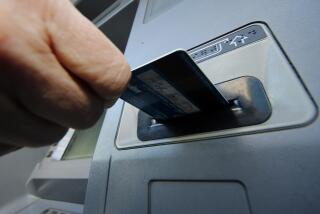THE CUTTING EDGE: COMPUTING / TECHNOLOGY / INNOVATION : Small Thrift Banks on Success of On-Line Service : Financial: Kentucky savings and loan will be first to allow deposits and bill-paying via Internet.
- Share via
With a few taps of a computer keyboard at a New York press conference this morning, a small Kentucky savings and loan will claim bragging rights as the first bank to conduct true on-line banking on the Internet.
The move by Security First Network Bank comes as much bigger banks--computer savvy Wells Fargo & Co., for example--believe some security problems remain to be solved before fund transfers can be safely conducted over the Internet.
But Security First, a unit of Cardinal Bancshares of Lexington, Ky., is pushing ahead, saying it has overcome those obstacles with a state-of-the-art security system.
Beginning this morning, the bank will let consumers pay bills, make deposits and view their account balances over the Internet 24 hours a day, seven days a week--and with no waiting in lines.
Many large banks, in partnership with such software publishers as Microsoft Corp. and Intuit Inc. and on-line networks, such as Prodigy, are already providing similar services to people with home computers. And Wells Fargo operates an Internet site where customers can view their account balances.
But until Security First, nobody was permitting bank transactions over the Internet, which many observers believe will eventually be the most popular vehicle for a whole range of on-line services including banking, retailing and stock brokering.
James S. (Chip) Mahan, chairman and chief executive of Security First, said the bank’s target market is the estimated 2 million to 5 million professionals who have full-time Internet access on the job.
“These people hate banks--the inconvenience of waiting for a teller--and they hate fees,” Mahan said.
Security First’s market research through focus groups in Atlanta, Boston, Chicago and San Jose showed that 85% of these professionals would at least be willing to try Internet banking, Mahan said.
To attract customers, Mahan said he will provide bill-paying and certain other services free, although the bank’s regular checking accounts will pay no interest. Eventually, he expects the bank to make money through discount brokerage, cash management and other services.
Although Wells Fargo has qualms about the current encryption technology used to protect bank account information sent over the Internet, it agrees with Security First that the Internet is the most promising vehicle, said Gailyn Johnson, senior vice president for on-line banking.
Wells has been offering home banking since 1989 over direct phone lines to the bank and over the Prodigy service, she said. But its Internet site--open only 14 weeks--has already attracted as many customers as the other two access routes combined, she said.
Security First says that new security technology developed by SecureWare Inc. of Atlanta will protect the bank’s operating system from being attacked by computer criminals.
Customers will “talk” to the bank via a communications program--called a browser--sold by Netscape Communications Corp. In September, Netscape acknowledged serious security problems with some of its browsers but said that the glitches have been removed in the version that Security First customers will be using.
Mahan will conduct the bank’s first Internet transaction by electronically sending a contribution to the American Red Cross, a bank spokeswoman said.
The bank’s Internet address is http//www.sfnb.com.
More to Read
Inside the business of entertainment
The Wide Shot brings you news, analysis and insights on everything from streaming wars to production — and what it all means for the future.
You may occasionally receive promotional content from the Los Angeles Times.










